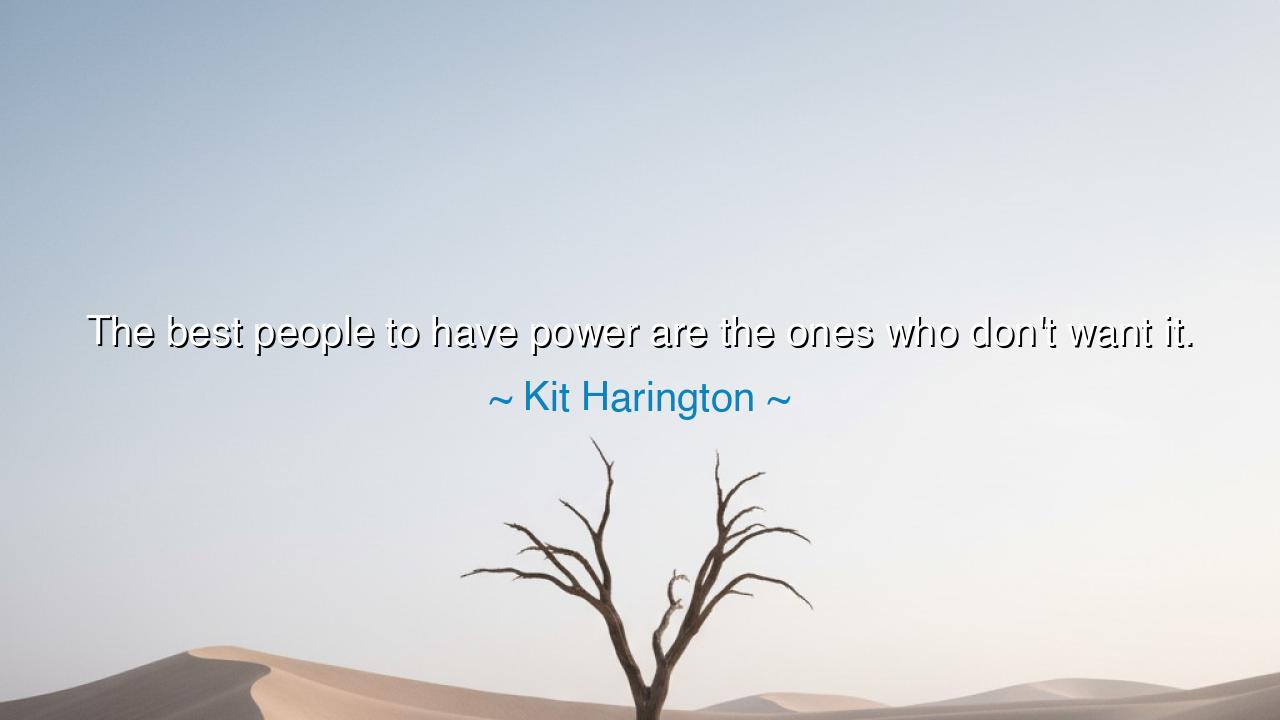
The best people to have power are the ones who don't want it.






In these insightful words, Kit Harington reflects on the paradox of power and the virtues of humility. He observes that the best people to have power are often those who do not seek it, those who are drawn to responsibility not out of ambition, but out of duty, wisdom, and moral clarity. Such individuals wield influence with restraint, guided by principle rather than desire for personal gain. Harington reminds us that true strength lies not in the hunger for dominance, but in the capacity to act rightly when power is entrusted.
The origin of this reflection can be traced to ancient philosophy, where thinkers long understood that the pursuit of power often corrupts. Plato, in his Republic, described the ideal ruler as a philosopher-king—someone who governs not for personal ambition but because they possess virtue and knowledge, and only reluctantly accepts authority. Harington’s modern observation echoes this classical wisdom: those who do not crave control often exercise it most judiciously, unclouded by ego and untainted by self-interest.
History offers clear illustrations of this principle. Consider George Washington, who assumed the presidency of the United States not out of desire for grandeur, but out of a sense of duty to the fledgling nation. He repeatedly refused excessive honors and power, stepping down after two terms to set a precedent for civic responsibility. His restraint and disinterest in personal gain allowed him to govern with integrity and earn enduring respect, embodying Harington’s belief that those who do not seek power are often its wisest bearers.
The quote also underscores a profound ethical lesson: the desire for power can distort judgment, inflame ambition, and blind leaders to justice. Those who avoid the trappings of authority, by contrast, often act from reflection, principle, and compassion. They govern not to aggrandize themselves, but to serve, to protect, and to uphold what is right. Harington reminds us that the qualities of restraint, humility, and service are what make power virtuous rather than destructive.
Ultimately, this quote is a meditation on leadership, morality, and the nature of influence. Harington teaches future generations that the truest measure of a leader is not ambition, but character—the ability to wield power responsibly when it falls into one’s hands. Let this wisdom endure: those who do not hunger for dominion, yet accept it with courage and principle, are the stewards most worthy of guiding others through the storms and challenges of human life. True power lies not in desire, but in disciplined and selfless execution.






IFBao Nguyen Rainbow - Music Is Forever
This perspective highlights the tension between ambition and virtue. The idea that the most ethical leaders are often the least eager for authority feels true, but it also exposes a flaw in human systems. We often equate confidence with competence, ignoring humility. Should leadership be about wanting to rule, or about feeling called to serve?
PHPham Hoa
There’s a moral weight to this quote that I really appreciate. It makes me think about how power tests a person’s character more than it reveals their skill. Maybe those who don’t want it are less likely to corrupt themselves with it. But it also raises a difficult question—if someone truly doesn’t desire power, can they still have the drive to use it effectively?
NANguyen Ngoc Anh
I find this statement both comforting and frustrating. Comforting because it points to integrity as a key to leadership, but frustrating because it’s so rare. The people who might lead wisely are often too humble to pursue power, leaving room for those who crave it most. How do we design societies that attract the right kind of people to lead?
CDChanhh Dayy
This reminds me of the archetype of the reluctant hero—someone who leads because they must, not because they desire glory. It’s noble, but also idealistic. In real life, is it possible to find people who truly don’t want power yet are willing to take responsibility for others? Or does power inevitably change even the most well-intentioned person?
VVitPhuong
I think there’s a lot of truth in this idea. People who don’t seek power often value service, fairness, and humility more than control. Yet, it also makes me question whether such individuals can survive in systems that reward aggression and competition. Can goodness and reluctance coexist with the ruthless pragmatism that leadership sometimes requires?